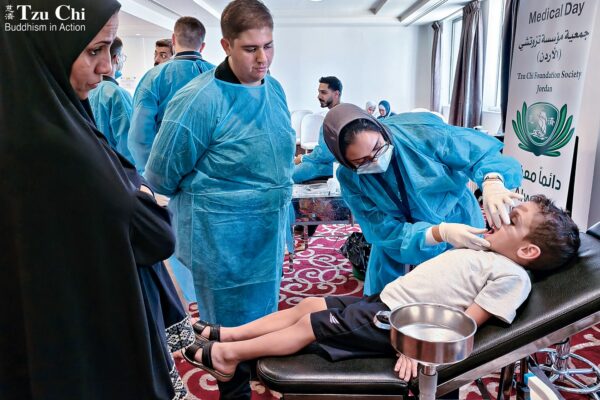By Yang Shun-bin
Abridged and translated by Wu Hsiao-ting
Photos by Yan Lin-zhao
Tzu Chi currently has more than 200 community care locations for the elderly across Taiwan. In July 2019, the foundation established its first senior day-care center, further expanding its services for the senior population.
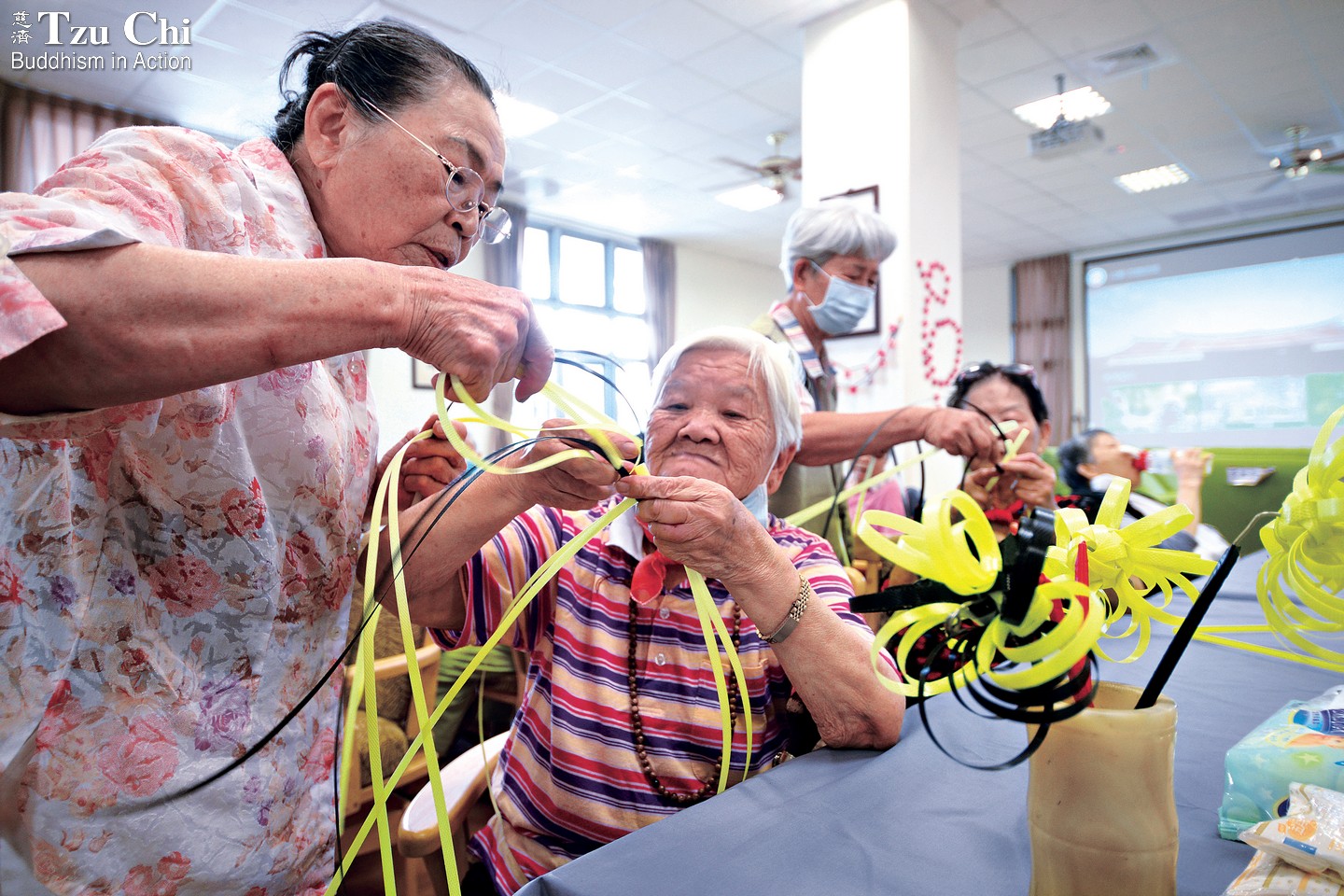
Seniors at the day-care center at the Tzu Chi Miaoli Campus use recycled materials to make handicrafts in a recycling education class.
“
Good morning!”
“And good morning to you too!”
It was around seven-thirty, and older people warmly greeted each other as they arrived one after another at the Tzu Chi Miaoli Campus in northern Taiwan. Some had been brought by family members, others by Rehabus, a government-sponsored bus service for people with disabilities.
Occupying an area of nearly 24 hectares (60 acres), the Miaoli Campus looks more like an ecological park. Boasting large expanses of natural landscape, it serves as a Tzu Chi community activity center and is also home to the foundation’s first educational center for disaster prevention and preparedness. The campus took on an additional role in July 2019 when Tzu Chi’s first senior day-care center opened there.
The day-care center has been approved to provide care for 30 seniors. Though newly established, many people have signed up for the program. In the center’s clean, comfortable space, every senior has their own locker, seat, recliner for taking a nap, and toiletries. Each program participant has their own thick journal in which care providers at the center record their daily blood pressure, weight, the medications they take for the day, and other relevant information. How they perform at the center is also noted in their journals for their family’s reference. Photos of the seniors participating in the center’s activities are even shared real-time via messaging apps so that their family’s minds can be put at ease.
Yang Qiu-feng (楊秋鳳), 83, is one of the program participants. Despite her age, she is mentally and physically nimble. She was elected class president for the program, and can often be seen encouraging participation in the center’s activities or giving a hand to other seniors who are in poorer health.
“I was the oldest participant when I first came here, but now I’ve been surpassed,” Yang said with a hearty laugh. She went on to recount her duties as a class president: helping to keep an eye on other participants, maintaining class order and tidiness, assisting to serve lunches, etc.
It’s hard to imagine Yang depressed and unhappy, but that is what she was before she started coming to the center. An operation on her spine had constrained her mobility and sapped her strength. When her family left for work each day, she was left alone at home, dozing or watching TV. But that was in the past. Now she leaves home every morning with her son. He goes to work and she goes to the center, where she and other older people pick vegetables, draw, exercise, sing karaoke, and attend DIY recycling courses according to their daily schedule. Her days have become much happier and a lot more fulfilling since she’s been attending.
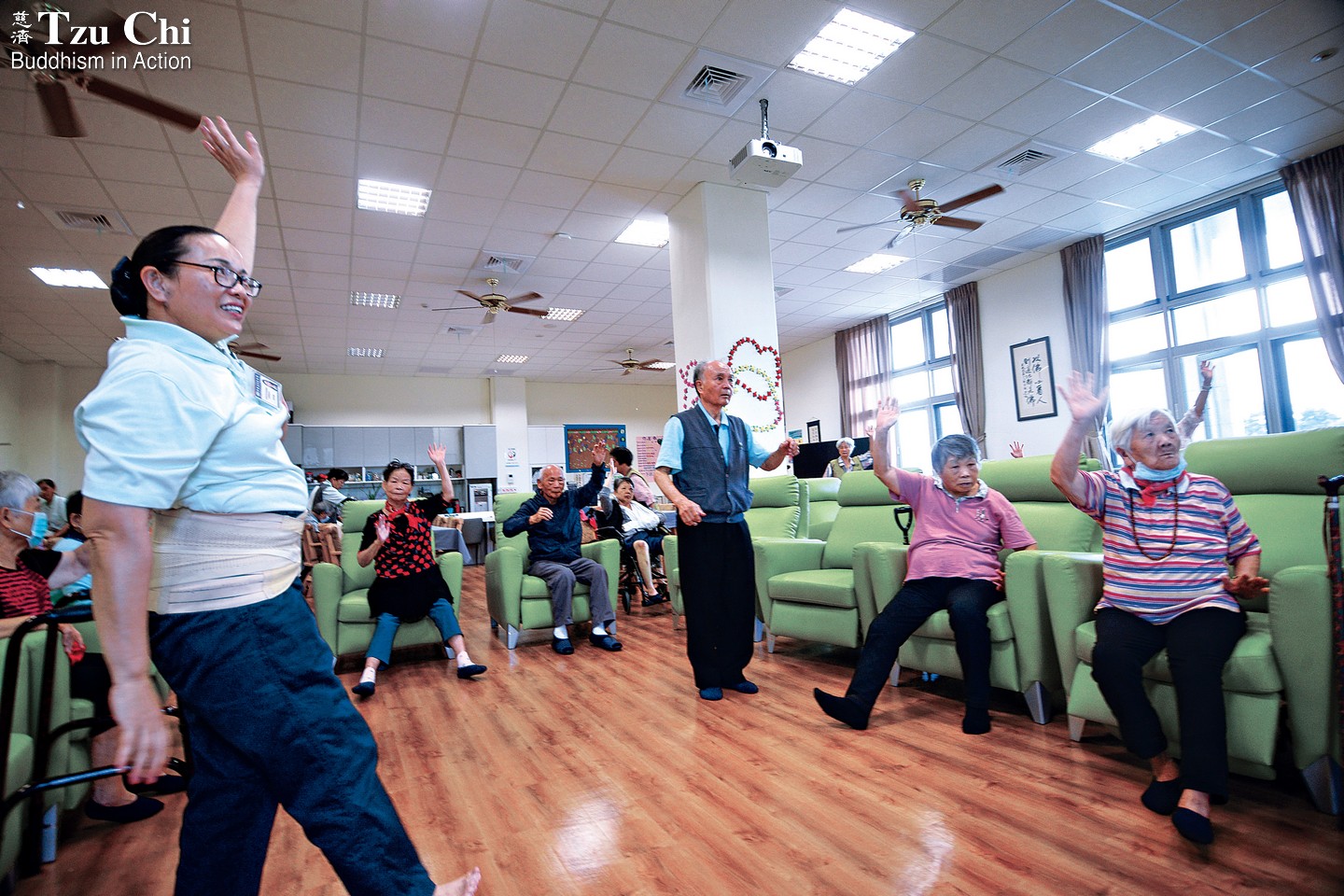
Care provider Wu Qi-wei (left) leads program participants at the day-care center in doing exercises to start a new day. They watch a video of exercises for older people produced by Taiwan’s Ministry of Health and Welfare and copy the movements.
Helping them regain their functions
Liu Liang-yin (劉亮吟) is a senior staffer at the Tzu Chi Long-Term Care Promotion and Development Center. A retired acute ward nurse, she helped launch the day-care center and is now helping its operation get on track. She entered the field of long-term care because of her affection for elderly people and her wish to create an ideal life for the senior population.
“Our day-care center is different from a typical nursing home in that people who come here can still function in everyday life,” Liu explained. “It’s just that a sudden illness or other issues have made them less capable of taking care of themselves. Our work here is to help them regain the functions they might have lost.” She pointed out that though the seniors who come to the center are still relatively healthy, the center still evaluates their performance on ADL and IADL scales. ADL refers to “Activities of Daily Living” and includes the most basic functions of living, while IADL means “Instrumental Activities of Daily Living” and is comprised of more complex skills. The center uses the seniors’ ADL and IADL performance to determine their dietary needs and rehabilitation objectives.
Liu said that when people care for their elders, they tend to do too much for them. For example, they feed the older people instead of letting them eat themselves. Or, out of fear that the older people might fall, they limit the senior’s movement as much as possible. These actions, though well intentioned, end up decreasing the seniors’ ability to take care of themselves.
To avoid these situations, the team at the center encourages and lets the seniors do things for themselves as much as possible, such as feeding themselves and moving around on their own. This helps them regain their lost functions. Even if they can’t regain one hundred percent of their lost functions, just recovering 30 to 50 percent is enough of an encouragement for the older people and their family.
There was, for instance, a program participant who liked to be pushed around in his wheelchair even though he could still walk himself. Care providers at the center did their best to persuade him to move around more on his own. Eventually he agreed to do so and would stand from a chair with the help of a walking stick and walk to fetch stuff for himself. People who don’t know better might take issue with the center’s approach, but it was done to stimulate the man’s ability to take care of himself. This method has been effective in helping the seniors at the center improve their mobility and other skills.
Liu Liang-yin said that the team at the center tries to run the program in the form of a class. There is a class president and vice president and regulations to follow. Anyone who wants to stay at the center has to follow the regulations. Every participant is around the same age, and they each have their own physical or health issues, but those whose condition is better can often be seen helping those whose condition is worse.
The care providers at the center play only an auxiliary role—they don’t actively serve the seniors, but instead encourage them to help themselves. But that doesn’t mean that their job is an easy one. They are on their feet almost all day, from greeting program participants when they arrive at the center in the morning to seeing them off at the end of a day. They rarely have a chance to sit and have to pay close attention to the seniors’ needs and safety. Wu Qi-wei (吳琦瑋), one of the care providers, said that she is so exhausted after work every day that she often collapses into a chair when she gets home.
Wu has another identity in addition to her work as a care provider at the center: She’s a Tzu Chi volunteer too. She’s been active in Tzu Chi for over three decades. She’s done all kinds of volunteer work, including visiting the needy, serving older people at Tzu Chi’s community care locations, and providing support and guidance for students attending Tzu Chi schools. Now she serves at the center. She’s been a devoted disciple of Master Cheng Yen the whole time and has tried her best to follow in her footsteps.
In addition to Wu, there are at present two other care providers at the center. Their average age is 60. Only one of the them has worked as a professional care provider before; the other two are both senior Tzu Chi volunteers who, embracing a passion for serving others, underwent training in order to work at the center. They work hard to help create an environment where seniors in the community, including Tzu Chi volunteers, enjoy spending time.
“We’ll all grow old one day,” Liu Liang-yin commented. “How will you want to be treated when you are old? As you sow, so shall you reap. We treat the seniors at the center as we ourselves want to be treated when we are old.”
Liu added that loving just a little is different from loving a lot. Even though the staff at the center is not large, everyone gives their all. It’s hard work serving at the center and it’s inevitable to feel pressure, but the pressure comes from wanting to do a better job. A senior might begin to show improvement after they’ve spent several months at a similar institute, but at the center their improvement is often obvious in just a few weeks. The team at the center feels that all their hard work is worth it when they see the seniors they serve making progress day by day.
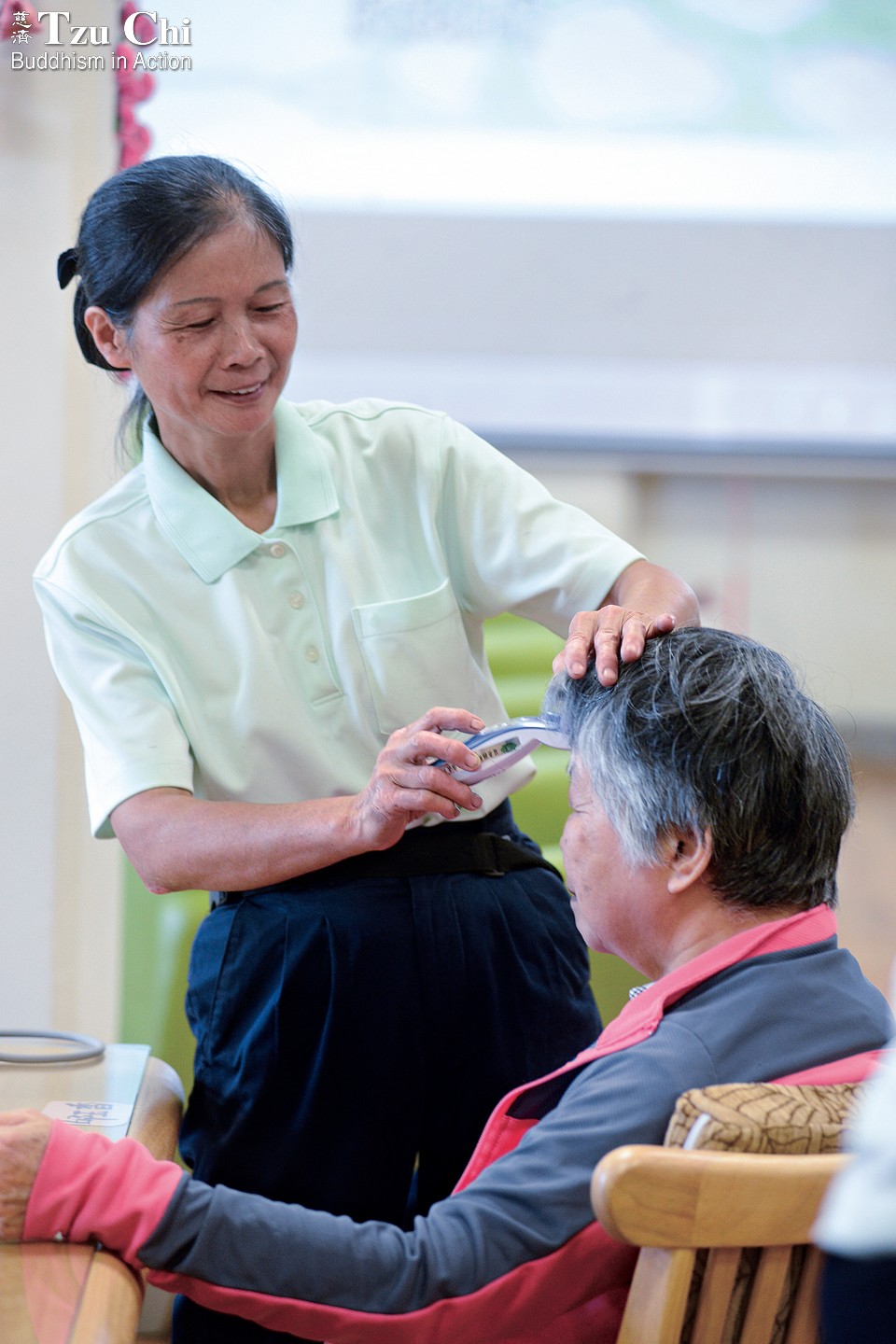
Every care provider at the day-care center serves an average of five to ten seniors. They provide assistance to the older people and record their daily blood pressure readings, body temperature, and weight as well as their appetites and even the number of times the seniors go to the bathroom. This is done to give their family peace of mind.
Liu Liang-yin, a senior staffer at the Tzu Chi Long-Term Care Promotion and Development Center, has a background in nursing. She often interviews program participants at the Tzu Chi Miaoli Day-Care Center to better understand their condition, including the extent of their physical or mental disabilities and how much family support they are receiving.
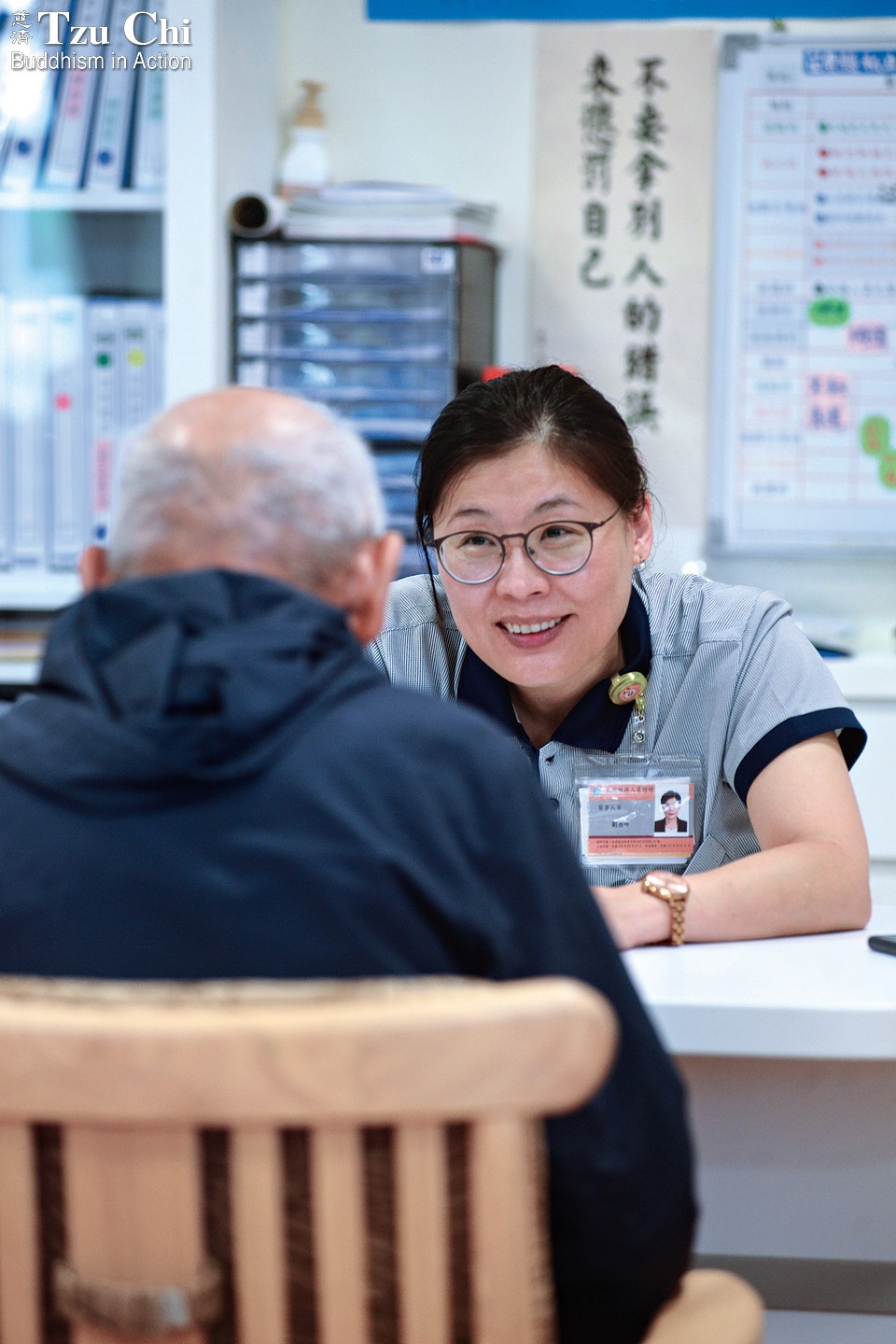
Bringing charity and medicine together
Taiwan officially became an aged society in April 2018, meaning that at least 14 percent of its population is 65 or older. In other words, one in seven people in Taiwan is a senior. The government has projected that in just seven or eight years people aged 65 or older will account for at least 20 percent of the entire population in Taiwan. Faced with the growing need for geriatric care, the government launched Long-Term Care Plan 2.0, a revised edition of the original plan, dubbed version 1.0. This is an effort to raise the quality and amount of care available to Taiwan’s elderly and disabled population.
“In fact, long-term care for the needy was something Tzu Chi was already providing 54 years ago, when Master Cheng Yen first founded Tzu Chi in 1966,” said Zhuang Shu-ting (莊淑婷), deputy convener of the Tzu Chi Long-Term Care Promotion and Development Center. Zhuang said that the foundation’s first long-term care recipient was an elderly woman named Lin Zeng (林曾). Tzu Chi gave her rice and financial aid every month, and even hired people to cook for her and tend to her other needs.
To provide better services for people needing long-term care and in response to the government’s new long-term care plan, the foundation established the Long-Term Care Promotion and Development Center in August 2018. The center integrated two independent long-term care systems, one from Tzu Chi’s charity mission and one from its medical mission. Now people who need long-term care just need to call Tzu Chi’s long-term care hotline or contact the government’s referral system to receive services from Tzu Chi.
The Tzu Chi Miaoli Campus is the second base of the Long-Term Care Promotion and Development Center that provides a comprehensive three-tier service for the public. (The first is in Taichung Jing Si Hall.) There are on-site case managers to handle applications from the public. They evaluate applicants’ needs and help them obtain long-term care resources. The campus also provides in-home care services or day-care services. Elderly people can apply for caregivers to go to their homes, or they can go to the day-care center at the campus. In addition, seniors who live near the campus can go in two days a week for half-day events and to share meals together.
The Miaoli facility currently serves more than 600 older people. Its model of operation will be replicated at Tzu Chi’s Jing Si Halls across Taiwan in the future so that more people can have easy access to long-term care resources.
Zhuang Shu-ting pointed out that Tzu Chi brings charity and medicine together in an integrated long-term care system so that the foundation can reach more people in need. When a patient is to be discharged from a Tzu Chi hospital and the medical team who cares for him finds that he will need long-term care services at home, they can make referrals for him to receive the services. The reverse is also true: If an in-home care provider finds someone she cares for needs medical care, she can make referrals for him to receive appropriate medical treatment.
Zhuang gives an example to illustrate her point. In early 2019, an old man named Chen who suffered from middle-stage dementia checked into Taichung Tzu Chi Hospital to have surgery for a bone fracture. When it came time to discharge him, hospital workers determined that he and his wife would need long-term care services at home. In response, they referred him to a case manager for evaluation. The case manager subsequently discovered that the couple lived in a remote old house that didn’t even have an indoor toilet, and that their daughter lived out of town. A meal delivery service was immediately arranged for them, and an in-home care provider was assigned to visit them regularly to bathe them and clean for them. Tzu Chi volunteers were called in for help too. More than 30 volunteers worked together to spring-clean the house before Chinese New Year. They also delivered brand-new furniture and everyday household items to the couple.
“Long-term care is a combination of 70 percent charitable resources and 30 percent medical resources,” Zhuang explained. Tzu Chi’s long-term care aims to provide integrated, comprehensive services to anyone in need through its various services in this field, including the newly established day-care center and more than 200 community care locations all over Taiwan. The community care locations offer a variety of services, including activities or memory upkeep classes for the elderly. Some have on-site case managers that can help people obtain long-term care resources, and some provide in-home care services.
Growing older is something we all will face and will always come with challenges. Through its financial, physical, medical, and emotional support for the elderly, Tzu Chi is helping empower Taiwan’s population to age with grace and dignity.
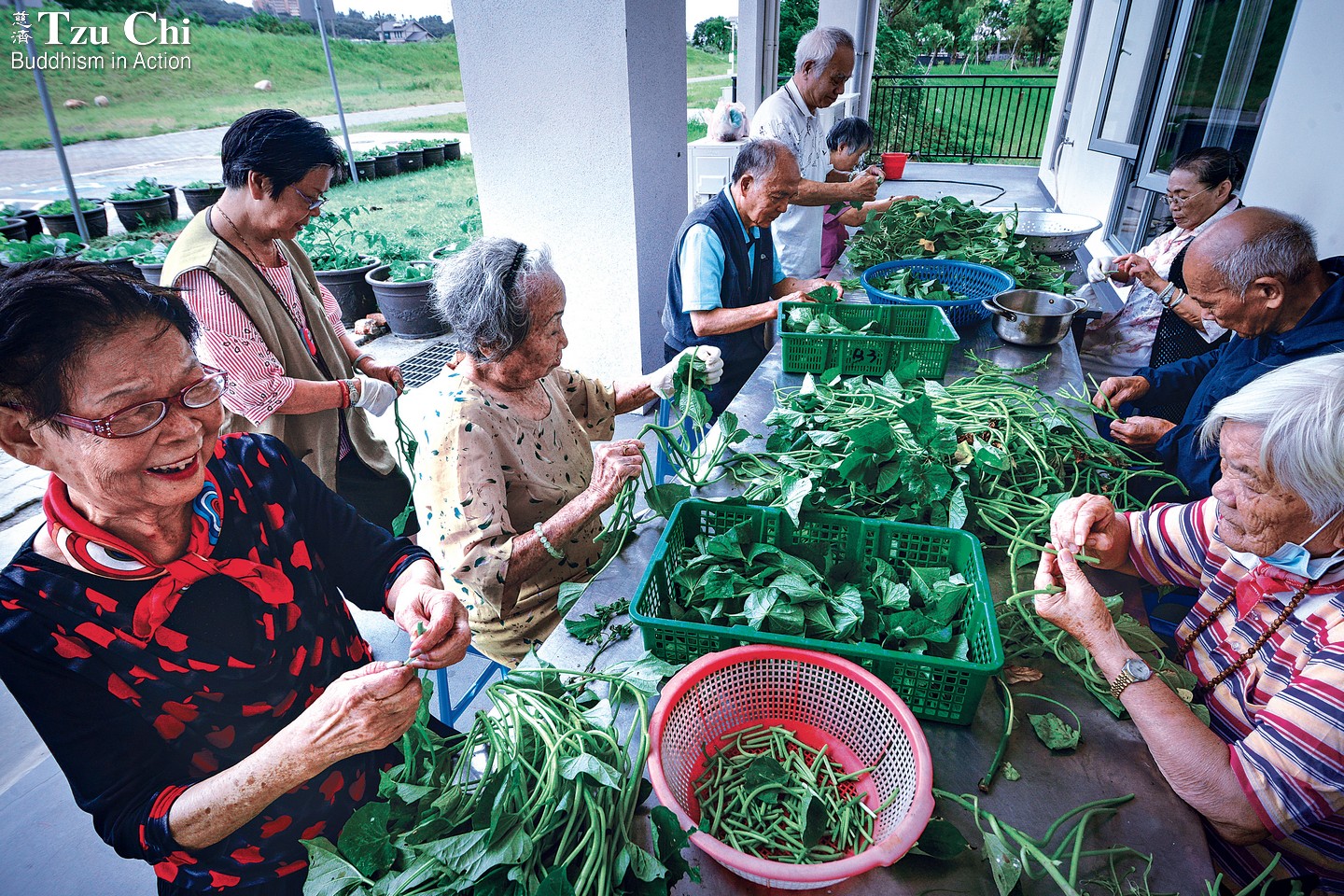
Seniors at the day-care center pick vegetables while chatting with each other.
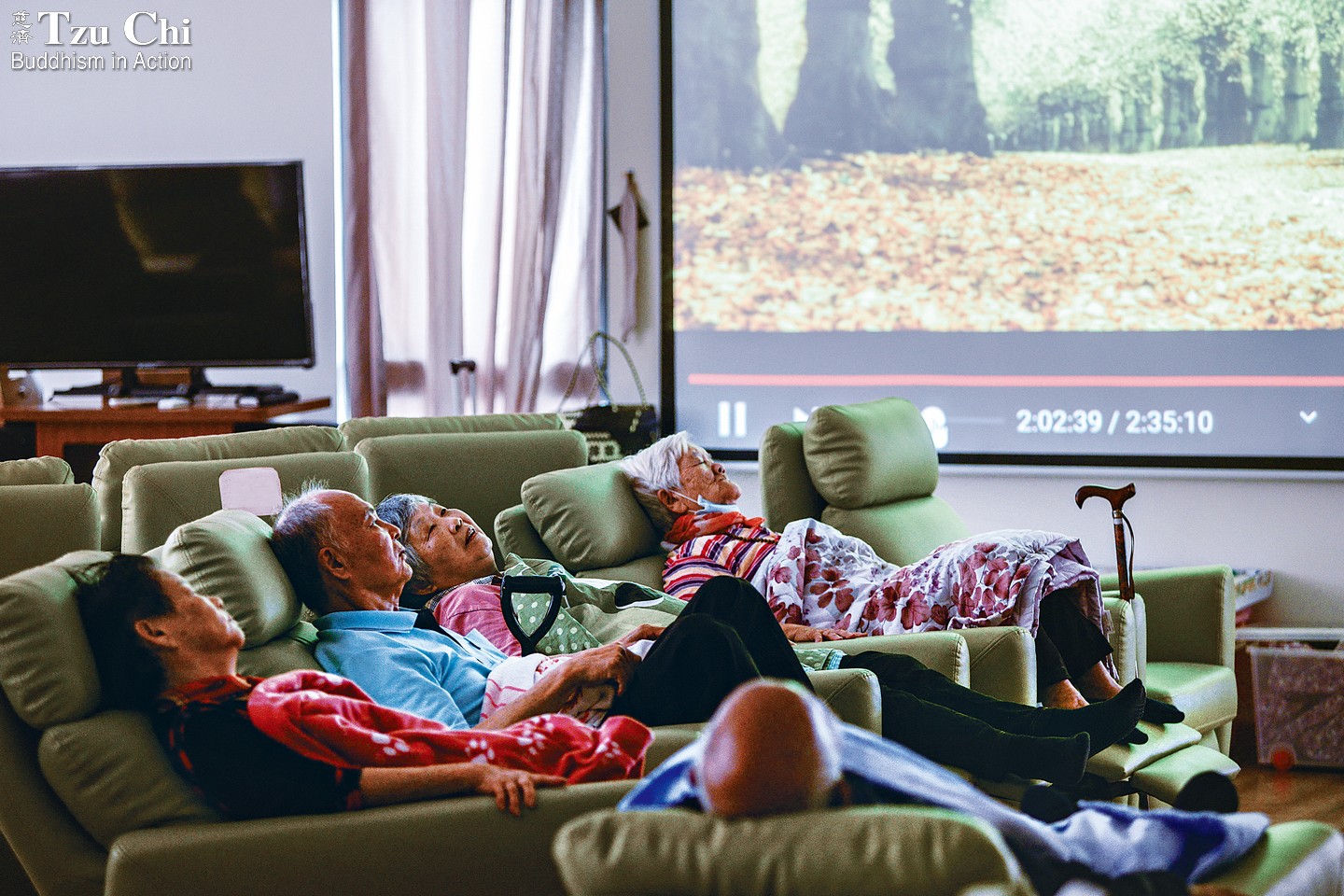
Every program participant at the center has their own seat and recliner. They walk around indoors ten times after lunch each day to help digestion and then take a nap.



